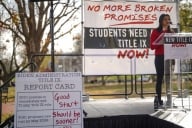You have /5 articles left.
Sign up for a free account or log in.
The American Historical Association on Friday published a sweeping revision of its statement on professional conduct.
For the first time, the statement covers not only basic issues like the role of teaching and research, but more philosophical questions such as what historians are and what values they share.
The document stands behind the AHA's recent controversial decision to stop investigating allegations of plagiarism, and to let colleges take the lead in dealing with such accusations. But in the wake of a series of scandals involving historians, the association also released curricular suggestions to help faculty members teach both undergraduates and graduate students about plagiarism and how to be sure that their work is original.
Defining the Profession
In defining the discipline's shared values, the statement calls for unassailable integrity in research -- while simultaneously stressing that just about any good interpretation can, should and will be challenged by someone.
Historians, the statement says, "do not fabricate evidence. Forgery and fraud violate the most basic foundations on which historians construct their interpretations of the past. An undetected counterfeit undermines not just the historical arguments of the forger, but all subsequent scholarship that relies on the forger's work. Those who invent, alter, remove, or destroy evidence make it difficult for any serious historian ever wholly to trust their work again."
The statement goes on to differentiate between primary and secondary sources and calls on historians to leave "a clear [bibliographic] trail for subsequent historians to follow."
Portions of the statement are directed to non-historians trying to figure out the profession. "Among the core principles of the historical profession that can seem counterintuitive to non-historians is the conviction, very widely if not universally shared among historians since the nineteenth century, that practicing history with integrity does not mean being neutral or having no point of view.... The very nature of our discipline means that historians also understand that all knowledge is situated in time and place, that all interpretations express a point of view.... Because the record of the past is so fragmentary, absolute historical knowledge is denied us."
As a result, the statement explains, historians will frequently disagree on many issues, and such disagreement -- as long as it takes place with a spirit of "mutual respect" -- is essential. "Frustrating as these disagreements and uncertainties may be even for historians, they are an irreducible feature of the discipline. In contesting each other's interpretations, professional historians recognize that the resulting disagreements can deepen and enrich historical understanding by generating new questions, new arguments, and new lines of investigation," the statement says.
The effort to revise the statement was led by William J. Cronon, the Frederick Jackson Turner Professor of History, Geography, and Environmental Studies at the University of Wisconsin at Madison.
"The older documents consisted of a series of statements -- do's and don'ts -- without providing the underlying logic," Cronon said in an interview. "We wanted to make an affirmative statement on the values that all professional historians share."
He said that he hoped the statement's call for civil debate would resonate in the discipline and more broadly in academe and society as a whole. "One of the reasons I personally value civility is as a reaction to what I take to be a feature of contemporary culture where people call attention to themselves by exaggerated overstatements of their own positions and caricatures of another person's positions," Cronon said.
"History is a discipline where people are used to disagreeing with each other," he said, so perhaps it can serve as a model for civilized disagreements.
Policing the Profession
Cronon defended the association's refusal to get involved in judging plagiarism disputes, and leaving that to the colleges or other groups that hire historians.
He said that colleges have actual sanctions they can impose on a professor, whereas the AHA has no job to take away or, as is the case with some medical professional societies, license to revoke.
He said that the AHA needs instead to prevent plagiarism in "a proactive way," such as by issuing the new suggestions on teaching students about research misconduct. He added that in his entire education, the topic of plagiarism "was never discussed."
The curricular materials issued by the AHA include definitions, readings and exercises.
The exercises for the graduate students focus on a range of issues -- those that will affect them both as teachers and as students. In the former category, for instance, one example features an undergraduate who copies 10 percent of the material in a research paper from online sources, but whose thesis and the other 90 percent of the material were original. "Is there a relationship between the extent and kind of plagiarism and the magnitude of the offense?" the exercise asks.
Another example discusses a Ph.D. student doing a dissertation on George Washington, and her adviser noticing that some passages resembled those from other works. The graduate student says that textual similarities were "unavoidable" given that all Washington biographers "drew on the same set of primary sources and described the same events." Graduate students are asked to consider whether this statement justifies similarities in material.








